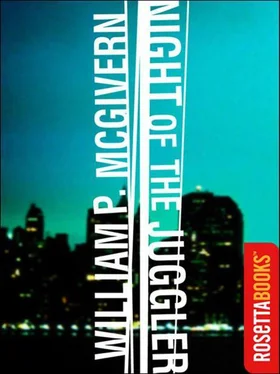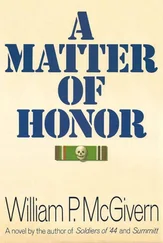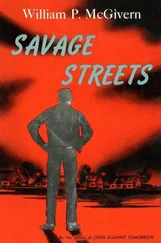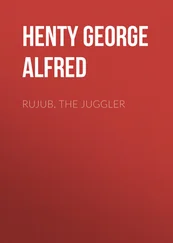William McGivern - Night of the Juggler
Здесь есть возможность читать онлайн «William McGivern - Night of the Juggler» весь текст электронной книги совершенно бесплатно (целиком полную версию без сокращений). В некоторых случаях можно слушать аудио, скачать через торрент в формате fb2 и присутствует краткое содержание. Жанр: Триллер, на английском языке. Описание произведения, (предисловие) а так же отзывы посетителей доступны на портале библиотеки ЛибКат.
- Название:Night of the Juggler
- Автор:
- Жанр:
- Год:неизвестен
- ISBN:нет данных
- Рейтинг книги:3 / 5. Голосов: 1
-
Избранное:Добавить в избранное
- Отзывы:
-
Ваша оценка:
- 60
- 1
- 2
- 3
- 4
- 5
Night of the Juggler: краткое содержание, описание и аннотация
Предлагаем к чтению аннотацию, описание, краткое содержание или предисловие (зависит от того, что написал сам автор книги «Night of the Juggler»). Если вы не нашли необходимую информацию о книге — напишите в комментариях, мы постараемся отыскать её.
Night of the Juggler — читать онлайн бесплатно полную книгу (весь текст) целиком
Ниже представлен текст книги, разбитый по страницам. Система сохранения места последней прочитанной страницы, позволяет с удобством читать онлайн бесплатно книгу «Night of the Juggler», без необходимости каждый раз заново искать на чём Вы остановились. Поставьте закладку, и сможете в любой момент перейти на страницу, на которой закончили чтение.
Интервал:
Закладка:
“That going to stop the Juggler?”
“Lieutenant, we learned a bitter lesson from North Koreans on the psychology of sound in combat. We paid a stiff price for not doing enough research into troop response to unexpected audio impacts. A soldier expects artillery fire, braces himself for it. But if silence is broken by something unexpected, laughter or singing, for instance, it can bring a column of troops to a full halt.
“You used the phrase ‘a wall of cops.’ I’m proposing a wall of music. It may not stop him, but it will confuse him. He’s bracing himself for sirens, flashing dome lights, police whistles. Not music. It’s a chance to destroy his game plan, take away the north end of the park. Then we’ve got him in a box. And when we make visual contact, you can take him out with one shot.”
Tonnelli made up his mind with a figurative finger snap. Putting the two-way radio to his lips, he flipped the switch and asked quietly for Sergeant Rusty Boyle.
Chapter 16
Kate Boyd was half running to keep up with Gus Soltik’s long strides.
His huge hand was tight on the collar of her ski jacket and her breathing was labored and difficult. With a flex of his thick wrist, he could strangle her or break her neck, she knew, but an instinct for survival and the genetic temper of her father strengthened her conviction that to show signs of panic and terror or to make any attempt to struggle against him would again create that dreadful response in his body.
They must be close to Seventy-fifth Street, she thought, trying to anesthetize her torturing fear with distracting considerations. They had already passed the Bethesda Fountain in one of the southern coves of the lake. She had walked the steps to the water there many times and had had ice cream in the fountain cafe, with the smell of the fresh lake around them and the sun shining on bronze statues. Somewhere off to their right was the Conservatory Pond. She remembered a story about it. Stuart Little had won a race there at the helm of the Wasp. . It was a dear book, and she kept it in a drawer beside her bed with the Hobbitt books and the story of Jay Trump, the lovely steeplechaser who had won the Maryland Hunt twice and the Grand National at Aintree, and thinking about this and her room and talking to Tish on the phone brought stinging tears to her eyes.
Luther Boyd’s estimate of the Juggler’s line of march and his eventual destination had been on the mark; the Juggler was heading north with Kate Boyd, following the East Drive toward the Receiving Reservoir, which was still almost two miles ahead of them. There he planned to swing east to avoid the precinct on Transverse Number Three, skirting the reservoir and continuing on toward the trackless sanctuaries in the jungle above Ninety-seventh Street.
But a word was forming in Gus Soltik’s mind, a word symbolizing a dangerous, frightening concept. The word that blazed now in the darkness of his mind was “coldness.” It was his surrogate for a dread expectation of shame and punishment. By people angry and loud. He couldn’t always remember who the people were, but he sensed that they were after him now.
The messages drumming on all of Gus Soltik’s physical receptors warned him that the men who would hurt him were close behind him. Above the sound of sporadic, spiraling winds he had heard someone shouting at the cars on Seventy-second Street, and that voice brought frightening memories of a powerful man with a scarred face who hated him and wanted to make him cry out in pain for mercy.
This was Gus Soltik’s deepest fear. He knew he deserved to be hurt.
(His mother and Mrs. Schultz had told him this, and they wouldn’t lie to him.) But the conditions of that punishment, consisting of relentless and endless torments whose nature he could only guess at, on occasion would pull him sharply from sleep, a moan in his throat, icy sweat on his trembling body.
He knew that he deserved to be beaten unconscious, then revived and hurt still more, but the cruelest terror was that this torture would never end, that there was no way he could be forgiven and allowed to die.
He stopped, tightening his grip on the collar of the young girl’s ski jacket, and looked back through the darkness toward Seventy-second Street.
Shadows drifted, and moonlight lay in silver patches on the ground. When he saw his big footprints in one of these pools of light and beside them the impress of the girl’s boots, he nodded then, knowing. .
Gus Soltik steered Kate through a thicket of trees at a right angle to his previous course until he came to a path formed of shale and rock.
He went north for another fifty yards, dragging the girl along behind him, leaving no trail on the hard surface of the path. The sound of their footsteps was covered by the traffic on the East Drive, which was twenty or thirty yards to their right, with automobile headlights flashing against the trees.
He was too close to the drive to feel safe. When they stopped following him, he would go back through the trees toward the lake and go north again past the boathouse to the big reservoir.
Gus Soltik sat in the shadow formed by a thicket of trees and pulled the girl down beside him. He put his airlines bag on the ground and looked at the girl.
Kate had been trying hard to control her emotions, but the effort was so physically draining that she felt faint and exhausted. There was an aching tension in her stomach, and she was afraid that at any instant she might burst into tears and begin to scream. But she knew that would be dangerous for her; she knew what that would do to him. That was one thing she was certain of.
She did not know specifically what he wanted to do to her, but her maturing sexual instincts warned her it would be agonizing and obscene.
She knew nothing about him, his fears, his torments, his rages. She did not know he had never been to a dentist, had never been treated by doctors or psychiatrists with shock therapy or tranquilizers. She did not know that he had dislocated a girl’s shoulder in a playground because she had grinned at him and that as a result he had been thrashed mercilessly by the athletic director of the school while two older boys had held his arms.
And that girl’s father had come to Mrs. Schultz’s home that night, and Gus, hiding in the basement, had heard the man’s wild, screaming voice declaring that he would kill him like a savage dog if he ever so much as looked at his daughter again.
As punishment his mother had made Gus Soltik stay outside all night in the muddy backyard of Mrs. Schultz’s home, wearing only sneakers, jeans, and a thin shirt, with the temperatures dropping below freezing. That was why cold and coldness had become to him surrogates of shame and punishment. The coldness and the shame and that girl’s father and the punishment had been forged into a single mnemonic unit in his brain.
At the age of eleven Kate Boyd knew the only way she could save her life was to analyze and attempt to apply a diverting therapy to this man who wanted to hurt and kill her.
Partly by luck and partly by virtue of shrewd female instinct, Kate Boyd composed a question which probed like a lance at a core of fear in Gus Soltik’s dreadfully twisted nature. She managed a tremulous smile and said in a practical voice, “If you wanted a date with me, why didn’t you just call me on the phone?”
The concept of the word “date” confused Gus Soltik. He felt a warmth on his cheeks. Her question made him uncomfortable. In his dim mind he knew what dating was. He had seen boys and girls, young men and young women, walking with their arms about each other’s waists.
Their smiles confused him. He saw them going into movie houses, laughing and talking easily, and he couldn’t understand it. The girls had razors and bottles of acid in their purses. They would hurt you if you touched them. He felt sorry for the boys, the young ones. He had wanted to be with a boy, he liked to look at them, an inchoate impulse he did not comprehend; but there was only Lanny, and he was different, he was old.
Читать дальшеИнтервал:
Закладка:
Похожие книги на «Night of the Juggler»
Представляем Вашему вниманию похожие книги на «Night of the Juggler» списком для выбора. Мы отобрали схожую по названию и смыслу литературу в надежде предоставить читателям больше вариантов отыскать новые, интересные, ещё непрочитанные произведения.
Обсуждение, отзывы о книге «Night of the Juggler» и просто собственные мнения читателей. Оставьте ваши комментарии, напишите, что Вы думаете о произведении, его смысле или главных героях. Укажите что конкретно понравилось, а что нет, и почему Вы так считаете.












